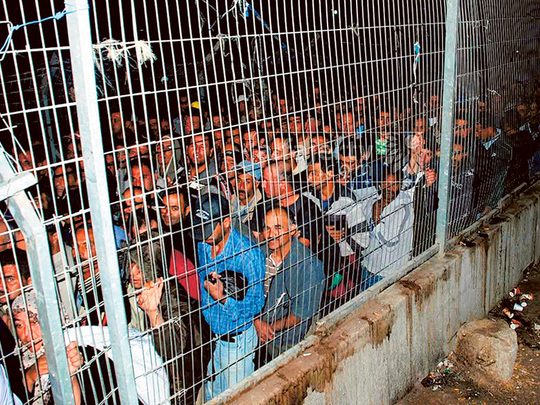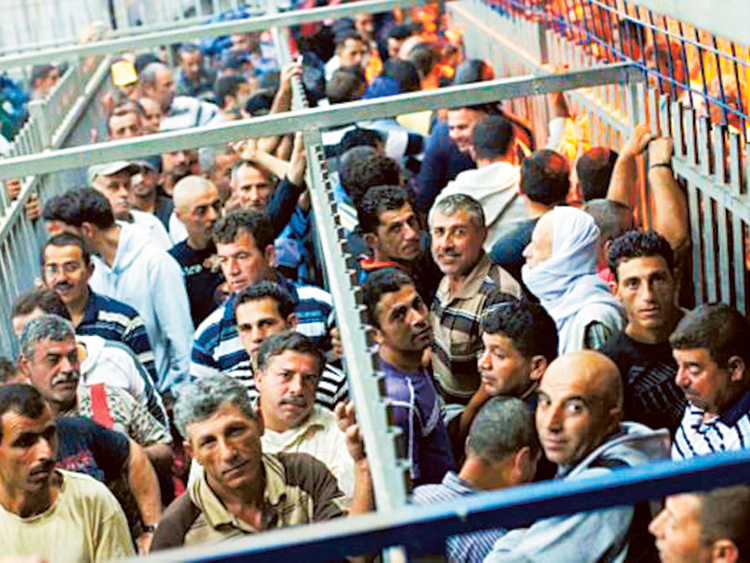
Ramallah: Hafez Odwan, 24, wishes for one night of restful sleep like an ordinary man, but the alarm clock placed right above his head, disturbs the peace, telling him it is time for his daily journey of suffering, humiliation and risk.
The alarm awakens him two hours after midnight to start his daily journey to work inside Israel. He is one of the thousands of Palestinians who are forced to illegally work in 1948 areas.
Unemployed Palestinian youths resort to buying expensive illegal work permits that allow them to work in 1948 areas, as there are more jobs. A staggering 43 per cent of Palestinian youth between the age of 20 and 24 are unemployed.
At 3:00am, he kisses his sleeping daughter goodbye, unsure that he will return home safely.
Odwan married a year-and-a-half ago, but barely gets a chance to see his wife and newborn daughter.
His daily routine is divided between the time he spends at the border crossing, which could last up to four hours and his actual duty which could be up to 12 hours.
This only leaves him with a few hours to secure work for the coming days and sleep.
His only day off, Saturday, is usually spent sleeping. For this purpose many labourers live in special rooms in their homes so they should not be disturbed. “My relationship with my family is virtually non-existent,” he told Gulf News.
“I also feel completely disconnected from my community, and I’m sure other labourers like me feel the same,” he said.
But for Odwan, the decision to work in Israel, although risky, was a necessity for him.
“After my father stopped working, it was up to me to provide for my family,” he said.
“When I first started working as a labourer, I was shocked by the danger I was exposed to, but now I’m used to it,” he said.
He never considered to stop working as a labourer.
“Now I have a wife and a daughter and I have to provide daily necessities to them. It is what a man must do, even if it is dangerous.”
The money he receives from working in Israel allows him to survive in the Occupied West Bank with its ever-rising cost of living.
“Even if I miraculously find work in my hometown, it wouldn’t be enough to provide my family with a decent living,” Odwan says.
At the border crossings, thousands of Palestinian labourers are crammed into a small cage-like area, hoping they can enter Israel to work. Many times scuffles erupt there due to the frustrating situation.
Once they manage to cross the border, they have to wait at bus stations hoping they will get some work.
“Sometimes I don’t get work and return home empty-handed,” says Odwan.
Missing out on work, even for a single day, can cost him dearly.
In order to secure a work permit, he pays a broker 2,200 shekels ($576).
If he is late in paying to his “fake employer” he can easily cancel his work permit with a simple phone call to the Israeli labour office.
The permit brokers are mostly Palestinians from the 1948 areas.
The workers give their identity cards, magnetic security clearance cards and money to brokers to purchase the work permits, who
then secure these from Israeli employers.
Labourers who had previously obtained permits through a specific broker will usually introduce other Palestinians looking for permits to him.
Brokers only talk face-to-face, and won’t discuss anything over the phone.
The labourers working on illegal Israeli work permits are highly vulnerable and constantly exploited and are often given difficult and dangerous jobs.
Israeli employers prefer hiring illegal workers because if they hire labourers legally, they have to pay for their medical insurance cost.
“It’s hard to concentrate on working as I am constantly on the lookout for Israeli police who roam workshops checking for illegal workers,” Odwan says.
“The poor concentration on work makes workers more prone to accidents.”
Dozens of Palestinian labourers with illegal work permits have lost their lives on the job. They are known as “martyrs for their families’ daily bread.”
During the last two years 51 Palestinian labourers lost their lives at their work places inside Israel, But none of the families of the victims were compensated by their employers or by the Israeli authorities, as they were considered as illegal workers who had violated Israeli labour laws.
Israeli security services and civil administration know about the illegal work permit trade but they are secretly promoting this practice, Shaher Sa’ad, secretary general of the Palestine General Federation of Trade and Labour Union, told Gulf News.
“Not a single work permit is sold without the approval, knowledge, supervision and blessing of the Israeli civil administrations in the West Bank,” he said.
Around 12,000 and 13,000 work permits are sold to Palestinian workers, and the thriving market has made many brokers extremely rich.
A total of 110,000 Palestinians enter 1948 areas daily to work legally, as well as thousands of others who enter illegally via the West Bank’s eight crossings.
This is in addition to the 40,000 Palestinians who work in Israeli colonies in the Occupied West Bank.












